The way we interact with technology is changing rapidly, and at the forefront of this transformation is voice search. Forget typing; more and more people are simply speaking their queries, commanding devices, and even making purchases with their voices. By 2025, voice search isn’t just a convenience; it’s an essential part of the digital landscape. If you’re looking to understand this powerful trend and leverage it for your own benefit, you’ve come to the right place.
This in-depth article will explore the latest voice search statistics 2025, revealing how people are using this technology, what devices they prefer, and what it all means for businesses and individuals alike. We’ll break down complex data into simple, easy-to-understand insights, ensuring you have the knowledge to thrive in a voice-first world.
Contents
- 1 The Voice Revolution: A Glimpse into 2025
- 2 Voice Assistant Growth Over Time
- 3 Who’s Talking and Why? Understanding Voice Search Users
- 4 What Are People Doing with Voice Search?
- 4.1 Everyday Activities
- 4.2 The Power of “Near Me” and Local Searches
- 4.3 Devices of Choice: Where Voice Search Happens
- 4.4 Voice Search and Business: A New Frontier for Marketing
- 4.5 The Accuracy of Voice Assistants: Trust and Reliability
- 4.6 SEO and Voice Search (VSEO): Optimizing for the Spoken Word
- 4.7 Driving More Calls and Customers from Voice Search
- 4.8 What Users Are Asking: Latest Insights from Quora & Reddit
- 4.9 Voice Search Challenges: The Road Ahead
- 4.10 Voice Search Trends 2025 and Beyond
- 5 Conclusion: Voice Search is Here to Stay
The Voice Revolution: A Glimpse into 2025
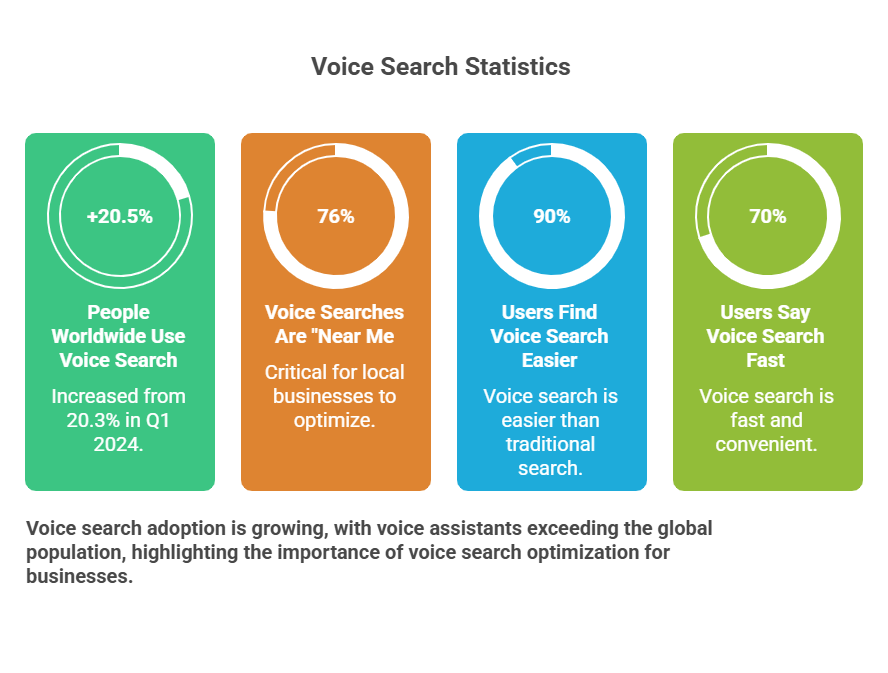
Imagine a world where your every command is met with an instant, accurate response. That world is already here, and it’s growing. As of 2025, a significant portion of the global population has embraced voice search.
- Nearly 1 in 5 people worldwide (20.5%) actively use voice search. This isn’t just a niche group; it’s a rapidly expanding segment of internet users who prefer speaking their minds to typing.
- Voice assistants now outnumber the global population! An astonishing 8.4 billion voice assistants are in use globally, a testament to their widespread adoption in homes, cars, and on personal devices. This number has doubled since 2020, showing just how quickly voice technology is integrating into our lives.
- The U.S. leads the charge. In the United States alone, 153.5 million people rely on voice assistants. This is an 8.1% increase from 2022, indicating a strong and continued upward trend.
These numbers clearly show that voice search is no longer a futuristic concept; it’s a present-day reality shaping consumer behavior and digital interactions.
Voice Assistant Growth Over Time
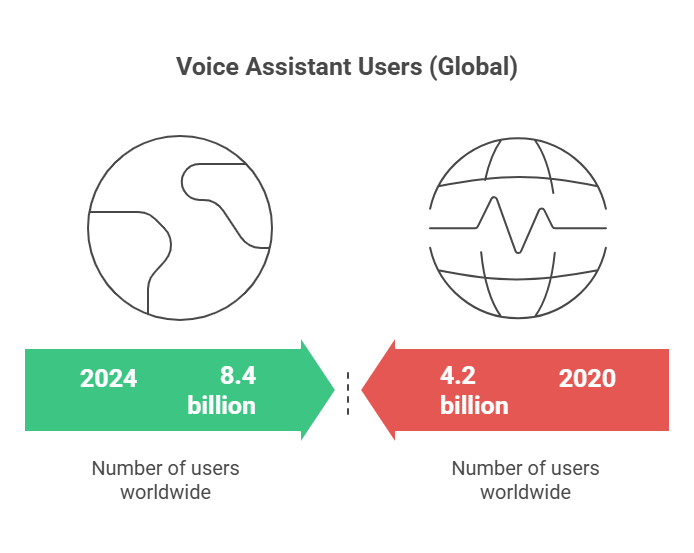
Let’s look at how the number of voice assistants has skyrocketed:
| Year | Number Of Voice Assistants In Use |
| 2024 | 8.4 billion |
| 2020 | 4.2 billion |
| 2019 | 3.25 billion |
Who’s Talking and Why? Understanding Voice Search Users
Voice search is popular across various demographics, but some groups are particularly enthusiastic adopters.
1. Global Voice Search Usage
The share of internet users worldwide who use voice search has seen some fluctuations but remains substantial:
| Quarter | Share of Internet users |
| Q2 2024 | 20.50% |
| Q1 2024 | 20.30% |
| Q4 2023 | 20.10% |
| Q3 2023 | 19.60% |
| Q2 2023 | 20.00% |
| Q1 2023 | 20.10% |
| Q4 2022 | 19.03% |
| Q3 2022 | 21.70% |
| Q2 2022 | 22.50% |
2. Voice Assistant Users in the United States
The number of Americans embracing voice assistants continues to climb:
| Year | Number of Voice Assistant Users | Percentage Increase |
| 2026* | 157.1 million | 1.3% |
| 2025* | 153.5 million | 2.5% |
| 2024 | 149.8 million | 2.5% |
| 2023 | 146 million | 2.8% |
| 2022 | 142 million | – |
3. The Age of Voice: Who Uses It Most?
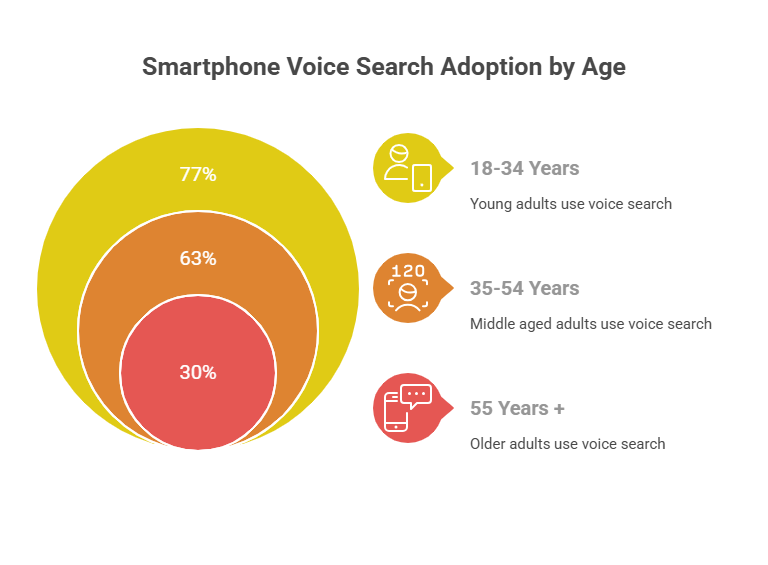
The younger generation is driving a lot of the voice search adoption. Individuals aged 18 to 34 years old are the most frequent voice search users, with a staggering 77% using it on their smartphones. However, voice search is gaining traction across all age groups, showing its universal appeal.
Here’s how different age groups engage with voice search on various devices:
| Device | 18 to 34 Years | 35 to 54 Years | 55 Years + |
| Smartphone | 77% | 63% | 30% |
| Desktop/Laptop | 38% | 32% | 15% |
| Tablet | 37% | 32% | 9% |
| Smart speaker | 34% | 19% | 4% |
4. Why the Preference for Voice?
People love voice search for its sheer convenience and efficiency.
- 90% of people believe voice search is easier than traditional online searching.
- 70% use voice search because it’s fast and easy.
- 89% find voice search more convenient, especially when multitasking.
- 71% prefer using a voice assistant over typing for their queries.
This overwhelming preference for ease and speed highlights a crucial shift in user expectations.
What Are People Doing with Voice Search?
Voice search isn’t just for asking basic questions; users are integrating it into many aspects of their daily lives.
Everyday Activities
Voice assistants are helping us with a wide range of tasks:
- 75% of people in the U.S. use voice search to check the weather.
- 71% use it to search for music.
- 64% use it for news updates.
- 62% use it for entertainment.
These activities demonstrate how voice search has become a go-to tool for quick information and everyday convenience.
Here’s a detailed look at voice search usage across different sectors in the U.S.:
| Sector | Voice Search Users In US |
| Weather | 75% |
| Music | 71% |
| News | 64% |
| Entertainment | 62% |
| Retail | 54% |
| Food delivery and restaurants | 52% |
| Healthcare and wellness | 51% |
| Consumer packaged food | 49% |
| Local services | 49% |
| Making a reservation | 47% |
| Fitness | 46% |
| Fashion | 45% |
| Travel | 43% |
| Finance | 42% |
| Other | 42% |
The Power of “Near Me” and Local Searches
A significant driver of voice search is the desire for local information.
- 76% of voice searches are “near me” or local queries. This is a massive opportunity for local businesses to connect with customers precisely when they are looking for products or services in their vicinity.
- 58% of consumers use voice search to find local business information. They are looking for addresses, phone numbers, hours, and directions.
- 51% of consumers use voice search to research restaurants. This makes restaurants the most commonly voice-searched business, followed by grocery stores, food delivery, and clothing stores.
This strong link to local search highlights the need for businesses to optimize their online presence for voice.
Top Activities Carried Out Using Voice Search Globally
| Activities | Percentage Of Consumers That Use Voice Search To Perform Activities. |
| Playing music | 74% |
| Checking weather | 66% |
| Setting alarms and reminders | 58% |
Devices of Choice: Where Voice Search Happens
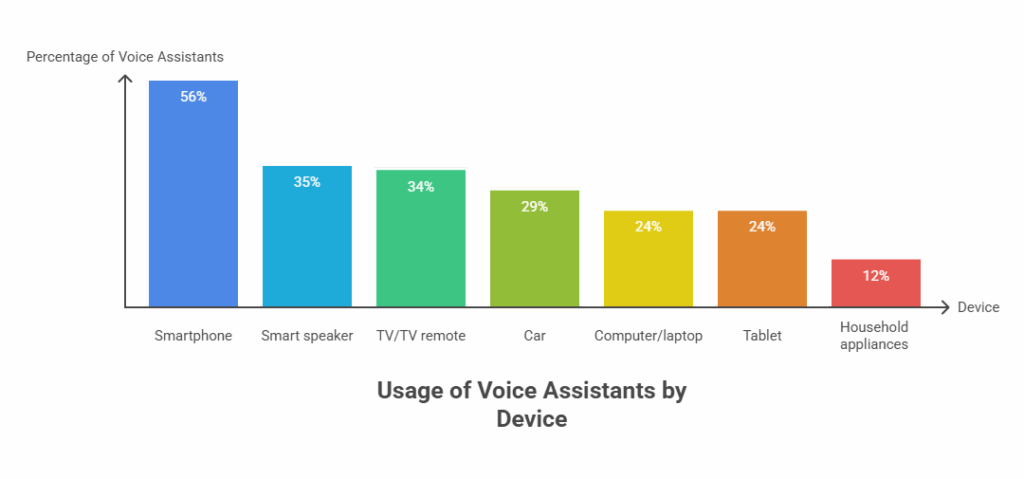
Voice search isn’t confined to a single device. People are using it on various platforms, from their pockets to their living rooms.
- Smartphones are leading the way. Approximately 27% of people use voice search on their mobile devices, and 56% of consumers specifically use voice assistants on their smartphones.
- Smart speakers are gaining ground. 75% of households are expected to own smart speaker devices by 2025. These devices are often placed in common areas, making them accessible for family use.
Here’s a breakdown of where people are using their voice assistants:
| Device | Percentage Of Voice Assistants |
| Smartphone | 56% |
| Smart speaker | 35% |
| TV/TV remote | 34% |
| Car | 29% |
| Computer/laptop | 24% |
| Tablet | 24% |
| Household appliances | 12% |
Smart Speaker Insights
Smart speakers are more than just novelties; they are becoming integrated into daily life.
- 52% of smart speaker users report using them daily.
- 52% place their smart speakers in the family room, 25% in bedrooms, and 22% in kitchens, indicating their role as household hubs.
- 41% of smart speaker owners have two or more devices, showing a strong commitment to the technology.
This widespread adoption of smart speakers means businesses have new channels to reach consumers directly in their homes.
Voice Search and Business: A New Frontier for Marketing
For businesses, voice search presents both challenges and incredible opportunities. Understanding how consumers interact with brands through voice is crucial for staying competitive.
Consumer Expectations from Brands
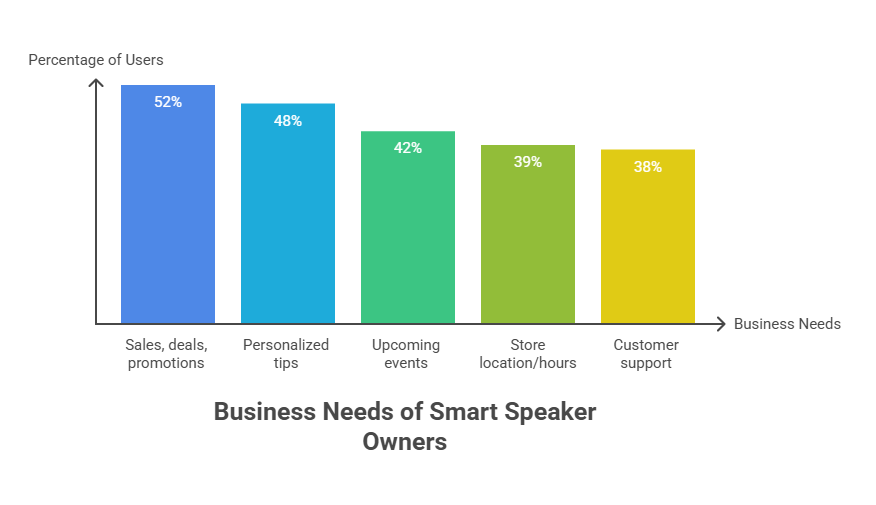
People are open to engaging with brands via voice, especially when it offers value.
- 52% of smart speaker owners want information about deals, promotions, and sales.
- 48% appreciate personalized tips and recommendations.
- 42% look for information about upcoming events or activities.
- 39% want options to find store locations and hours.
- 38% seek access to customer support.
These insights reveal a clear demand for brands to offer useful and personalized experiences through voice channels.
How Voice Search Impacts Shopping
Voice search is increasingly influencing purchase decisions, from research to post-purchase tracking.
- 51% of online shoppers in the U.S. use voice assistance to research products.
- 30% use voice assistants to track packages.
- 20% use them to rate products.
- 17% use voice search to repurchase items.
Voice is expected to be a $45 billion channel by 2028, with current voice shopping accounting for over $3.3 billion in consumer spending. This signifies a massive revenue-driving growth opportunity.
Here’s how smart speakers are driving shopping-related activities in the U.S.:
- 38.8 million people (13.6% of the population) use smart speakers for shopping-related tasks.
- 8.9 million consumers purchased health and beauty products through smart speakers.
- 8.8 million electronic products were purchased online using voice.
The Appeal of Voice Ads
Voice advertisements are proving to be effective and well-received.
- 38% of users report voice ads are less invasive.
- 39% find voice ads more tempting than other ad formats.
- 40% of users have purchased a product after listening to its voice advertisement.
This suggests that voice ads can be a powerful tool for marketers looking for innovative ways to reach customers.
The Accuracy of Voice Assistants: Trust and Reliability
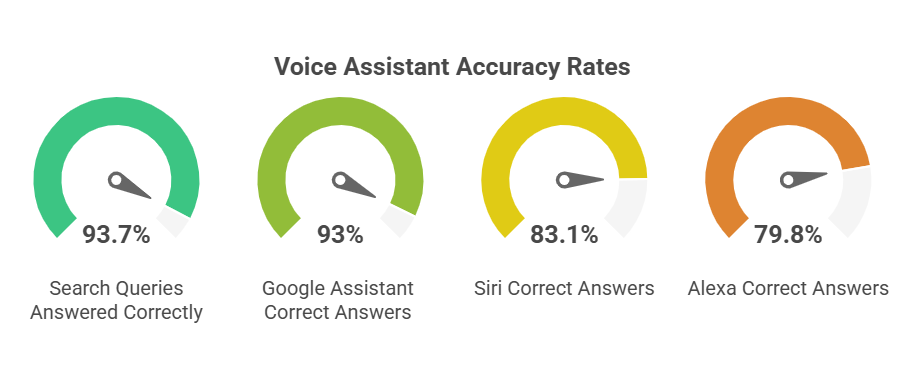
The success of voice search hinges on its ability to understand and correctly answer user queries. Fortunately, voice assistants are highly accurate.
- Voice assistants answer an average of 93.7% of search queries correctly.
- Google Assistant stands out with 100% query understanding and correctly answering nearly 93% of the time.
- Siri understands queries 99.8% of the time but provides correct answers 83.1% of the time.
- Alexa understands queries 99.9% of the time but provides correct answers 79.8% of the time.
This high level of accuracy builds user trust and encourages continued adoption of voice technology.
Here’s a comparison of voice assistant performance:
| Voice Assistant | Understood Questions | Answered Correctly |
| Google Assistant | 100% | 92.9% |
| Siri | 99.8% | 83.1% |
| Alexa | 99.9% | 79.8% |
SEO and Voice Search (VSEO): Optimizing for the Spoken Word
Just as you optimize your website for traditional text searches, you need to optimize for voice search. This is called Voice Search Engine Optimization (VSEO). The core principles are similar, but VSEO specifically focuses on the natural, conversational language people use when they speak.
Key VSEO Statistics
- Over 80% of voice search answers on Google Assistant come from the top three traditional search results. This means ranking high in regular searches is a significant advantage for voice search.
- Voice search is considered the most significant emerging SEO factor by 22.8% of SEO professionals.
- Voice search answers often come from SERP features, like featured snippets.
- Pages that rank for voice searches typically load 52% faster than the average search results. Speed is critical.
- The average word count of pages that rank for voice searches is approximately 2,312 words. This suggests that comprehensive, in-depth content performs well.
- More than 70% of websites that rank on Google Voice search results are HTTPS-secured. Security builds trust and is a ranking factor.
- Only 1.71% of voice search results come from pages with an exact match of the title tag. This indicates that Google’s algorithms are looking beyond simple keyword matching to understand context and intent.
- Voice search results tend to be around 29 words in length, reflecting the concise nature of spoken answers.
These statistics underscore the importance of adapting your SEO strategies for the nuances of voice.
Driving More Calls and Customers from Voice Search
Voice search is directly linked to local searches and an increase in valuable phone calls. When people search for local businesses with their voices, they often follow up by calling.
- 28% of consumers go on to call the business they voice searched for. This is the most common action after a voice search.
- Phone calls convert to 10-15 times more revenue than web leads. This makes calls one of the most valuable conversions from voice searches.
- Callers convert 30% faster than web leads and have a 28% higher retention rate.
Practical Tips for Businesses
To capture these valuable voice search customers:
- Optimize for Long-Tail Keywords: Voice searches are naturally longer and more conversational. Think about how someone would ask a question aloud (e.g., “What’s the best Italian restaurant near me that’s open now?”).
- Focus on Conversational Language: Your website content should answer questions directly and naturally, mirroring human speech.
- Prioritize Local SEO: Ensure your Google Business Profile is fully updated with accurate contact information, hours, and a clear description. Include “near me” phrases where appropriate in your content.
- Improve Page Speed: Fast-loading pages are crucial for voice search rankings.
- Secure Your Website (HTTPS): This is a non-negotiable for trust and ranking.
- Aim for Featured Snippets: These often become the direct answers provided by voice assistants.
- Mine Call Data: Analyze phone calls to your business to understand the questions consumers ask before buying. Use this information to refine your website content and SEO strategy.
- Personalize the Caller Experience: Since 80% of customers say the experience a company provides is as important as its products, ensure your phone interactions are seamless and personalized.
What Users Are Asking: Latest Insights from Quora & Reddit
Beyond the statistics, real-world user discussions on platforms like Quora and Reddit offer valuable insights into emerging voice search trends and concerns.
Common Questions and Concerns:
- “How can I stop my voice assistant from accidentally activating?” Many users report frustration with accidental activations, especially when discussing private topics. This highlights a need for more precise wake-word detection and better user control over listening modes.
- “Is my smart speaker always listening to me?” Privacy remains a top concern, with 41% of people fearing their digital assistants actively listen or record them. This ongoing debate about privacy underscores the importance of transparent privacy policies and robust security measures for voice technology providers.
- “What are the best privacy settings for my smart speaker?” Users are actively seeking ways to enhance their privacy, indicating a strong desire for greater control over their data and recordings.
- “How can I get my voice assistant to understand my accent better?” While accuracy is high, some users still face challenges with voice assistants understanding diverse accents or complex instructions, suggesting ongoing improvement in natural language processing (NLP) is needed.
- “Are voice assistants going to replace customer service agents?” This is a frequent question, reflecting both the promise and the perceived threat of AI in customer service. While voice assistants can handle basic queries, human agents are still seen as crucial for complex issues and personalized support.
- “What new commands or integrations are coming to voice assistants?” Users are always curious about new functionalities, showing an eagerness for advanced capabilities like mood detection, multi-turn conversations, and seamless integration with smart home devices.
These discussions reveal that while convenience is king, privacy, accuracy, and advanced capabilities are key areas of interest and concern for voice search users.
Voice Search Challenges: The Road Ahead
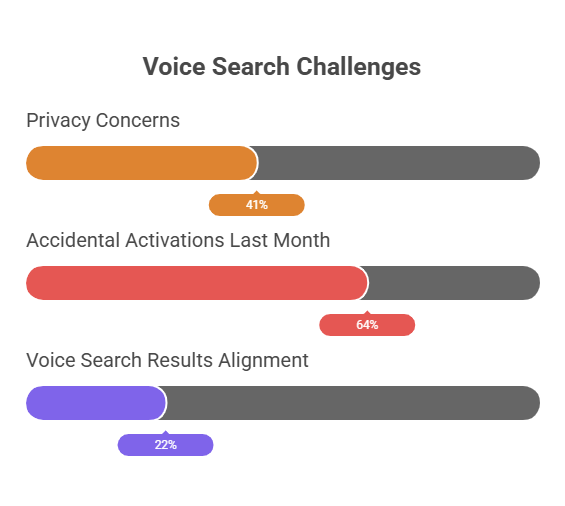
Despite its impressive growth, voice search faces some challenges:
- Privacy Concerns: 41% of people fear their digital assistants actively listen or record them, and over 40% are concerned about privacy when having digital assistants in their homes. Addressing these concerns with clear privacy policies and robust security is vital for continued adoption.
- Accidental Activations: 64% of people reported accidentally using a voice assistant in the last month, which can be disruptive and frustrating.
- Device Alignment: Only 22% of the time do voice search results align across different devices, which can lead to inconsistent user experiences.
Voice Search Trends 2025 and Beyond
The future of voice search is incredibly promising, with significant growth projected.
- The speech and voice recognition market is expected to reach $53.94 billion by 2030, growing at a compound annual growth rate (CAGR) of 24.4%.
- Voice shopping revenue is projected to hit $40 billion.
- Sales of smart speakers are expected to surpass $30 billion.
- Voice assistants are anticipated to become even more sophisticated, with the ability to understand your mood and respond accordingly.
- Multi-modal experiences, where voice is combined with visual interfaces, will become more common, offering richer interactions.
Conclusion: Voice Search is Here to Stay
Voice search is not merely a passing trend; it is a fundamental shift in how we interact with the digital world. With 1 in 5 people worldwide using voice search, and a staggering 8.4 billion voice assistants in use, its presence is undeniable. The convenience, speed, and accuracy offered by voice technology are driving its widespread adoption across all age groups and devices.
For businesses, understanding these voice search statistics 2025 is critical. Optimizing for conversational queries, prioritizing local SEO, enhancing page speed, and providing seamless customer experiences—both online and over the phone—are no longer optional but essential strategies. As voice technology continues to evolve, integrating it into your marketing and operational efforts will be crucial for connecting with customers and staying competitive in the ever-changing digital landscape. The future is speaking, and businesses that listen will thrive.
Frequently Asked Questions (FAQs)
Q1: What are the main reasons people prefer using voice search over typing?
A1: People primarily prefer voice search because they find it significantly easier (90% believe this), faster, and more convenient (70% for speed/ease, 89% for convenience) than traditional typing. This is especially true when multitasking or when hands-free operation is desired.
Q2: How accurate are popular voice assistants like Google Assistant and Siri in 2025?
A2: Voice assistants demonstrate high accuracy in 2025. Google Assistant leads with 100% query understanding and correctly answers nearly 93% of the time. Siri understands 99.8% of queries but provides correct answers approximately 83.1% of the time.
Q3: How important is local SEO for voice search?
A3: Local SEO is extremely important for voice search, as 76% of all voice searches are “near me” or local queries. Consumers frequently use voice to find information about local businesses, such as restaurants, grocery stores, and service providers, often leading to immediate calls or visits.
Q4: How does voice search impact consumer purchasing behavior?
A4: Voice search significantly impacts purchasing behavior, with 51% of online shoppers using it to research products. Consumers also use voice for post-purchase activities like tracking packages (30%) and rating products (20%). Voice shopping is projected to be a $40 billion channel, indicating a growing trend in voice-enabled commerce.
Q5: What are the key challenges currently facing voice search adoption?
A5: The main challenges facing voice search adoption include significant privacy concerns, with many users fearing their devices are always listening or recording them. Additionally, accidental activations of voice assistants are a common frustration, and inconsistent search results across different devices can sometimes hinder the user experience.
Sources
- Statista
